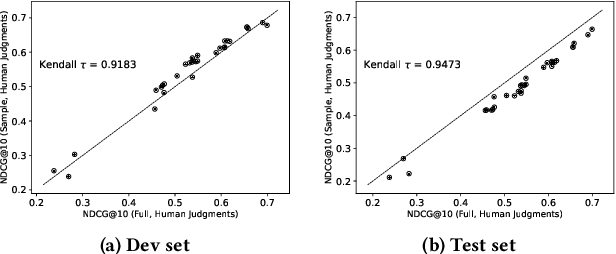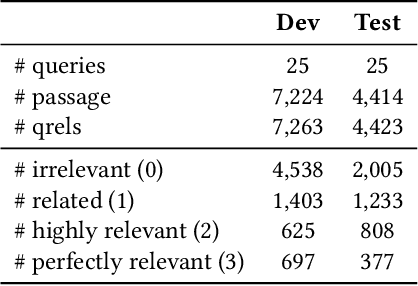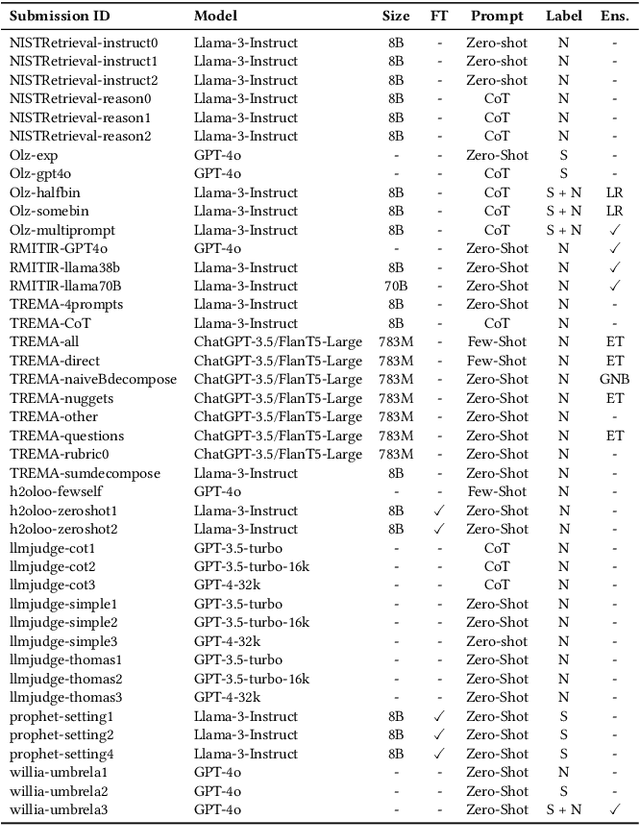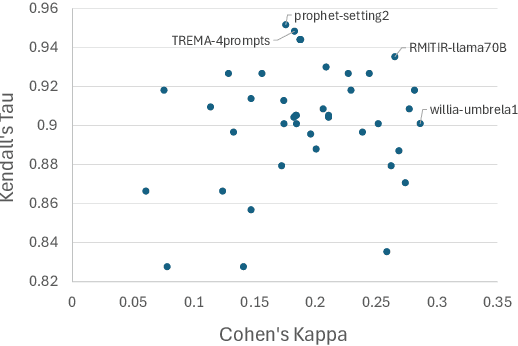Emine Yilmaz
Beyond Output Critique: Self-Correction via Task Distillation
Jan 31, 2026Abstract:Large language models (LLMs) have shown promising self-correction abilities, where iterative refinement improves the quality of generated responses. However, most existing approaches operate at the level of output critique, patching surface errors while often failing to correct deeper reasoning flaws. We propose SELF-THOUGHT, a framework that introduces an intermediate step of task abstraction before solution refinement. Given an input and an initial response, the model first distills the task into a structured template that captures key variables, constraints, and problem structure. This abstraction then guides solution instantiation, grounding subsequent responses in a clearer understanding of the task and reducing error propagation. Crucially, we show that these abstractions can be transferred across models: templates generated by larger models can serve as structured guides for smaller LLMs, which typically struggle with intrinsic self-correction. By reusing distilled task structures, smaller models achieve more reliable refinements without heavy fine-tuning or reliance on external verifiers. Experiments across diverse reasoning tasks demonstrate that SELF-THOUGHT improves accuracy, robustness, and generalization for both large and small models, offering a scalable path toward more reliable self-correcting language systems.
Automated Rubrics for Reliable Evaluation of Medical Dialogue Systems
Jan 21, 2026Abstract:Large Language Models (LLMs) are increasingly used for clinical decision support, where hallucinations and unsafe suggestions may pose direct risks to patient safety. These risks are particularly challenging as they often manifest as subtle clinical errors that evade detection by generic metrics, while expert-authored fine-grained rubrics remain costly to construct and difficult to scale. In this paper, we propose a retrieval-augmented multi-agent framework designed to automate the generation of instance-specific evaluation rubrics. Our approach grounds evaluation in authoritative medical evidence by decomposing retrieved content into atomic facts and synthesizing them with user interaction constraints to form verifiable, fine-grained evaluation criteria. Evaluated on HealthBench, our framework achieves a Clinical Intent Alignment (CIA) score of 60.12%, a statistically significant improvement over the GPT-4o baseline (55.16%). In discriminative tests, our rubrics yield a mean score delta ($μ_Δ = 8.658$) and an AUROC of 0.977, nearly doubling the quality separation achieved by GPT-4o baseline (4.972). Beyond evaluation, our rubrics effectively guide response refinement, improving quality by 9.2% (from 59.0% to 68.2%). This provides a scalable and transparent foundation for both evaluating and improving medical LLMs. The code is available at https://anonymous.4open.science/r/Automated-Rubric-Generation-AF3C/.
ATOD: An Evaluation Framework and Benchmark for Agentic Task-Oriented Dialogue System
Jan 17, 2026Abstract:Recent advances in task-oriented dialogue (TOD) systems, driven by large language models (LLMs) with extensive API and tool integration, have enabled conversational agents to coordinate interleaved goals, maintain long-horizon context, and act proactively through asynchronous execution. These capabilities extend beyond traditional TOD systems, yet existing benchmarks lack systematic support for evaluating such agentic behaviors. To address this gap, we introduce ATOD, a benchmark and synthetic dialogue generation pipeline that produces richly annotated conversations requiring long-term reasoning. ATOD captures key characteristics of advanced TOD, including multi-goal coordination, dependency management, memory, adaptability, and proactivity. Building on ATOD, we propose ATOD-Eval, a holistic evaluation framework that translates these dimensions into fine-grained metrics and supports reproducible offline and online evaluation. We further present a strong agentic memory-based evaluator for benchmarking on ATOD. Experiments show that ATOD-Eval enables comprehensive assessment across task completion, agentic capability, and response quality, and that the proposed evaluator offers a better accuracy-efficiency tradeoff compared to existing memory- and LLM-based approaches under this evaluation setting.
Self-Correcting Large Language Models: Generation vs. Multiple Choice
Nov 12, 2025Abstract:Large language models have recently demonstrated remarkable abilities to self-correct their responses through iterative refinement, often referred to as self-consistency or self-reflection. However, the dynamics of this self-correction mechanism may differ substantially depending on whether the model is tasked with open-ended text generation or with selecting the most appropriate response from multiple predefined options. In this paper, we conduct a systematic investigation of these two paradigms by comparing performance trends and error-correction behaviors across various natural language understanding and reasoning tasks, covering language models of different scales and families. Our experimental results reveal distinct patterns of improvement and failure modes: \textit{While open-ended generation often benefits from the flexibility of re-interpretation and compositional refinement, multiple-choice selection can leverage clearer solution boundaries but may be limited by the provided options}. This contrast also reflects the dual demands faced by emerging agentic LLM applications: effective agents must not only generate and refine open-ended plans or explanations, but also make reliable discrete choices when operating within constrained action spaces. Our findings, therefore, highlight that the design of self-correction mechanisms should take into account the interaction between task structure and output space, with implications for both knowledge-intensive reasoning and decision-oriented applications of LLMs.
Adaptive Multi-Agent Response Refinement in Conversational Systems
Nov 11, 2025Abstract:Large Language Models (LLMs) have demonstrated remarkable success in conversational systems by generating human-like responses. However, they can fall short, especially when required to account for personalization or specific knowledge. In real-life settings, it is impractical to rely on users to detect these errors and request a new response. One way to address this problem is to refine the response before returning it to the user. While existing approaches focus on refining responses within a single LLM, this method struggles to consider diverse aspects needed for effective conversations. In this work, we propose refining responses through a multi-agent framework, where each agent is assigned a specific role for each aspect. We focus on three key aspects crucial to conversational quality: factuality, personalization, and coherence. Each agent is responsible for reviewing and refining one of these aspects, and their feedback is then merged to improve the overall response. To enhance collaboration among them, we introduce a dynamic communication strategy. Instead of following a fixed sequence of agents, our approach adaptively selects and coordinates the most relevant agents based on the specific requirements of each query. We validate our framework on challenging conversational datasets, demonstrating that ours significantly outperforms relevant baselines, particularly in tasks involving knowledge or user's persona, or both.
Towards Understanding Bias in Synthetic Data for Evaluation
Jun 12, 2025Abstract:Test collections are crucial for evaluating Information Retrieval (IR) systems. Creating a diverse set of user queries for these collections can be challenging, and obtaining relevance judgments, which indicate how well retrieved documents match a query, is often costly and resource-intensive. Recently, generating synthetic datasets using Large Language Models (LLMs) has gained attention in various applications. While previous work has used LLMs to generate synthetic queries or documents to improve ranking models, using LLMs to create synthetic test collections is still relatively unexplored. Previous work~\cite{rahmani2024synthetic} showed that synthetic test collections have the potential to be used for system evaluation, however, more analysis is needed to validate this claim. In this paper, we thoroughly investigate the reliability of synthetic test collections constructed using LLMs, where LLMs are used to generate synthetic queries, labels, or both. In particular, we examine the potential biases that might occur when such test collections are used for evaluation. We first empirically show the presence of such bias in evaluation results and analyse the effects it might have on system evaluation. We further validate the presence of such bias using a linear mixed-effects model. Our analysis shows that while the effect of bias present in evaluation results obtained using synthetic test collections could be significant, for e.g.~computing absolute system performance, its effect may not be as significant in comparing relative system performance. Codes and data are available at: https://github.com/rahmanidashti/BiasSyntheticData.
PersonaLens: A Benchmark for Personalization Evaluation in Conversational AI Assistants
Jun 11, 2025Abstract:Large language models (LLMs) have advanced conversational AI assistants. However, systematically evaluating how well these assistants apply personalization--adapting to individual user preferences while completing tasks--remains challenging. Existing personalization benchmarks focus on chit-chat, non-conversational tasks, or narrow domains, failing to capture the complexities of personalized task-oriented assistance. To address this, we introduce PersonaLens, a comprehensive benchmark for evaluating personalization in task-oriented AI assistants. Our benchmark features diverse user profiles equipped with rich preferences and interaction histories, along with two specialized LLM-based agents: a user agent that engages in realistic task-oriented dialogues with AI assistants, and a judge agent that employs the LLM-as-a-Judge paradigm to assess personalization, response quality, and task success. Through extensive experiments with current LLM assistants across diverse tasks, we reveal significant variability in their personalization capabilities, providing crucial insights for advancing conversational AI systems.
Attributing Response to Context: A Jensen-Shannon Divergence Driven Mechanistic Study of Context Attribution in Retrieval-Augmented Generation
May 22, 2025Abstract:Retrieval-Augmented Generation (RAG) leverages large language models (LLMs) combined with external contexts to enhance the accuracy and reliability of generated responses. However, reliably attributing generated content to specific context segments, context attribution, remains challenging due to the computationally intensive nature of current methods, which often require extensive fine-tuning or human annotation. In this work, we introduce a novel Jensen-Shannon Divergence driven method to Attribute Response to Context (ARC-JSD), enabling efficient and accurate identification of essential context sentences without additional fine-tuning or surrogate modelling. Evaluations on a wide range of RAG benchmarks, such as TyDi QA, Hotpot QA, and Musique, using instruction-tuned LLMs in different scales demonstrate superior accuracy and significant computational efficiency improvements compared to the previous surrogate-based method. Furthermore, our mechanistic analysis reveals specific attention heads and multilayer perceptron (MLP) layers responsible for context attribution, providing valuable insights into the internal workings of RAG models.
Judging the Judges: A Collection of LLM-Generated Relevance Judgements
Feb 19, 2025



Abstract:Using Large Language Models (LLMs) for relevance assessments offers promising opportunities to improve Information Retrieval (IR), Natural Language Processing (NLP), and related fields. Indeed, LLMs hold the promise of allowing IR experimenters to build evaluation collections with a fraction of the manual human labor currently required. This could help with fresh topics on which there is still limited knowledge and could mitigate the challenges of evaluating ranking systems in low-resource scenarios, where it is challenging to find human annotators. Given the fast-paced recent developments in the domain, many questions concerning LLMs as assessors are yet to be answered. Among the aspects that require further investigation, we can list the impact of various components in a relevance judgment generation pipeline, such as the prompt used or the LLM chosen. This paper benchmarks and reports on the results of a large-scale automatic relevance judgment evaluation, the LLMJudge challenge at SIGIR 2024, where different relevance assessment approaches were proposed. In detail, we release and benchmark 42 LLM-generated labels of the TREC 2023 Deep Learning track relevance judgments produced by eight international teams who participated in the challenge. Given their diverse nature, these automatically generated relevance judgments can help the community not only investigate systematic biases caused by LLMs but also explore the effectiveness of ensemble models, analyze the trade-offs between different models and human assessors, and advance methodologies for improving automated evaluation techniques. The released resource is available at the following link: https://llm4eval.github.io/LLMJudge-benchmark/
KEIR @ ECIR 2025: The Second Workshop on Knowledge-Enhanced Information Retrieval
Jan 20, 2025Abstract:Pretrained language models (PLMs) like BERT and GPT-4 have become the foundation for modern information retrieval (IR) systems. However, existing PLM-based IR models primarily rely on the knowledge learned during training for prediction, limiting their ability to access and incorporate external, up-to-date, or domain-specific information. Therefore, current information retrieval systems struggle with semantic nuances, context relevance, and domain-specific issues. To address these challenges, we propose the second Knowledge-Enhanced Information Retrieval workshop (KEIR @ ECIR 2025) as a platform to discuss innovative approaches that integrate external knowledge, aiming to enhance the effectiveness of information retrieval in a rapidly evolving technological landscape. The goal of this workshop is to bring together researchers from academia and industry to discuss various aspects of knowledge-enhanced information retrieval.
 Add to Chrome
Add to Chrome Add to Firefox
Add to Firefox Add to Edge
Add to Edge